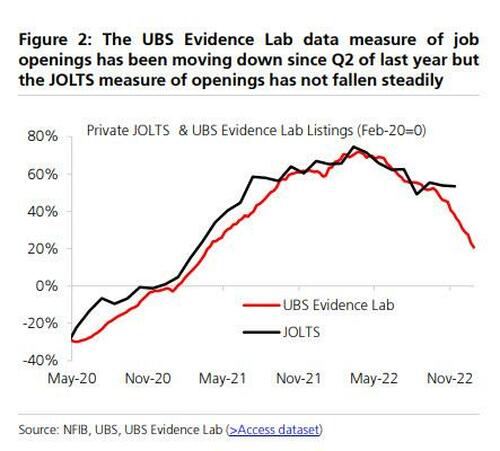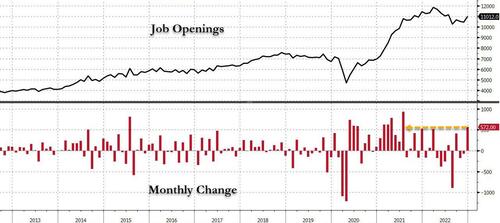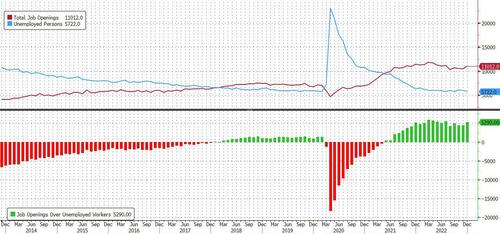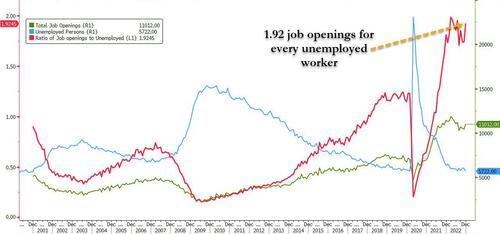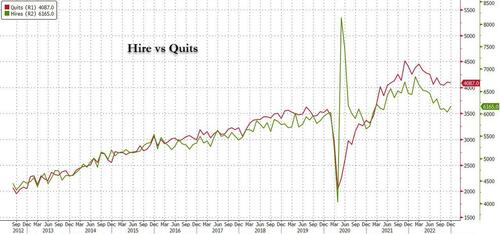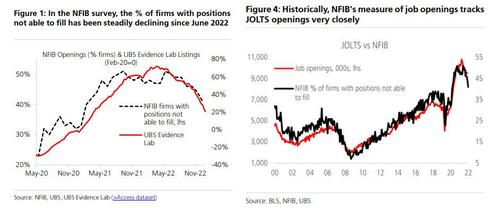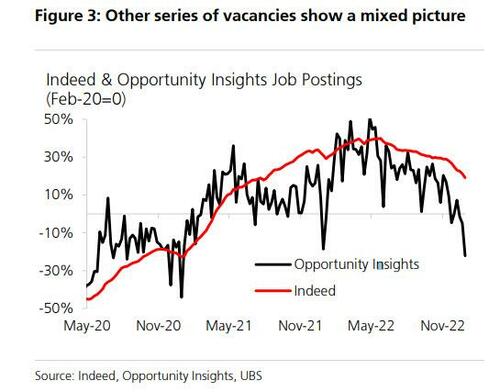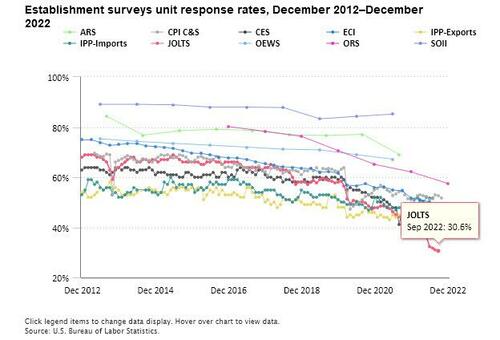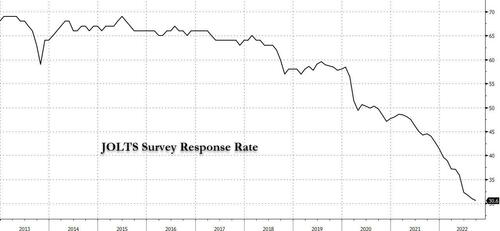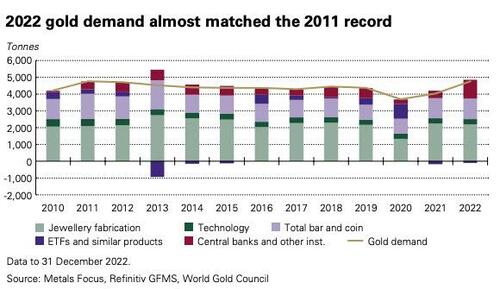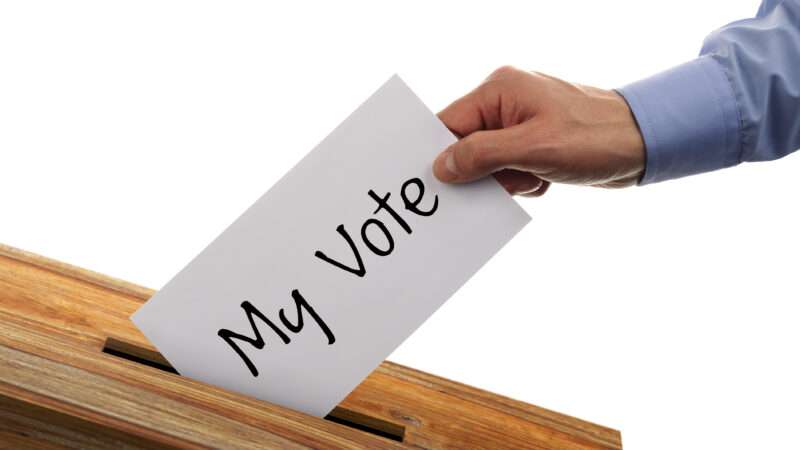Just Make it Up: Job Openings Unexpectedly Soar As Labor Department Now Guessing What The Number Is
What a coincidence: just yesterday we presented the latest report from UBS economists showing that the job openings “data” collected and presented by Biden’s Department of Labor is at best wrong (and at worst, manipulated propaganda meant to make the labor market appear stronger than it is), and that the reality is far worse than the BLS suggests, with real openings down 30% from the March 2022 peak and only 25% higher than the 2019 average.
Of course, this latest confirmation that the Bureau of Labor Statistics is making up data as it goes along comes at a time when the Philly Fed showed that the Biden admin’s payrolls number was overstated by over 1 million in Q2 2022, and that the number of layoffs was far higher than the DOL shows, as Goldman calculated.
So faced with a difficult choice: either come clean about the real labor numbers – now that US corporations are averaging one mass layoff announcement every 45 minutes – or just double down and keep reporting increasingly bigger lies, the Biden admin’s labor department has sadly but predictably decided to do what it does best by picking option two, and as today’s latest JOLTs report shows, it intends to keep digging and making the hole ever bigger.
To wit: after job openings dropped modestly for the previously two months into the waning months of 2022, in December (recall JOLTS is one-month lagged to the NFP report), and completely out of the blue, job openings exploded by a massive 572K, the most since July 2021 when the US was indeed on a crazy hiring spree, and pushing total job openings to just above 11 million, the highest since July 2022.
This was the fourth consecutive beat of expectations in the series, and an unprecedented 12 of the past 13 prints, just another garden variety six-sigma event by the “never political” BLS.
According to the BLS, in December, the largest increases in job openings were in accommodation and food services (+409,000), retail trade (+134,000), and construction (+82,000). The number of job openings decreased in information (-107,000). Ah yes, the neverending hiring spree of waiters and bartenders: the key anchor of every solid economy…
The latest surge in job openings means that after a two month break, there are once again 5.3 million more jobs than unemployed workers, not that far off from the all time high of 5.9 million in March 2022.
Said otherwise, there were 1.92 job openings for every unemployed worker, up from 1.74 last month. Needless to say, this number has a ways to drop to revert to its precovid levels around around 1.20…
And while job openings unexpectedly soared, the BLS finally noticed what we had been discussing in recent months, namely that after hiring inexplicably tumbled in recent months to the lowest since February 2021, in December it spiked higher surging by 131K to 6.165MM, the highest since August 2022. More importantly, the jump in hiring took place as quits declined, and finally the two series have converged after mysteriously diverging for much of the past two years.
Incidentally, it was the drop in quits – traditionally know as the “take this job and shove it” indicator as it reflects confidence that a worker can find a better paying job elsewhere (or else they wouldn’t quit voluntarily) – that attracted the attention of the WSJ’s Fed mouthpiece Nick Timiraos who specifically noted the drop in the quits rate to 2.9% from 3.0% in Nov and 3.3% a year ago.
Job openings rose to 11 million in Dec, sending the ratio of vacancies to unemployed workers up to 1.92 from 1.74 in Nov and 1.81 a year ago
But private sector quit rate (a sign of churn) ticked down to 2.9% in Dec from 3% in Nov and 3.3% one year earlierhttps://t.co/dkVcGipsXE pic.twitter.com/KP96mns1to
— Nick Timiraos (@NickTimiraos) February 1, 2023
So what to make of this ‘data’ which as not only UBS, but also the NFIB…
… and Opportunity Insights…
… discredit as fake news?
The answer is simple: well over half of it – or some 70% to be specific – is guesswork. As the BLS itself admits, while the response rate to most of its various labor (and other) surveys has collapsed in recent years…
… nothing is as bad as the JOLTS report where the actual response rate has tumbled to a record low 30.6%!
In other words, more than two thirds, or 70% of the final number of job openings, is estimated!
And at a time when it is critical for Biden to maintain the illusion that the labor market remains strong when everything else in Biden’s economy is on the verge of recession, we’ll let readers decide if the admin’s Labor Department is plugging the estimate gap with numbers that are stronger or weaker.
Tyler Durden
Wed, 02/01/2023 – 12:42
via ZeroHedge News https://ift.tt/HkQmsZj Tyler Durden
